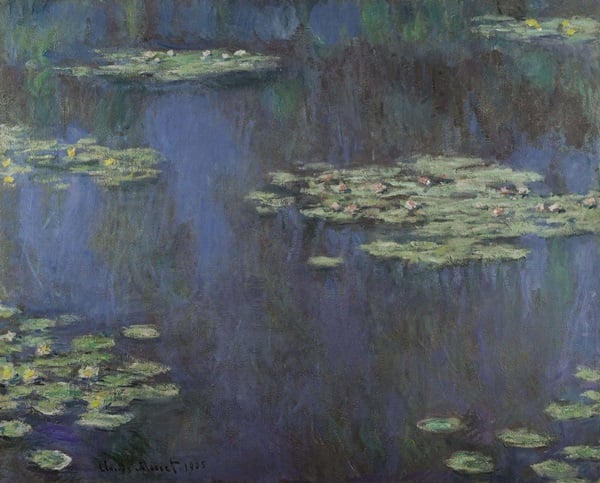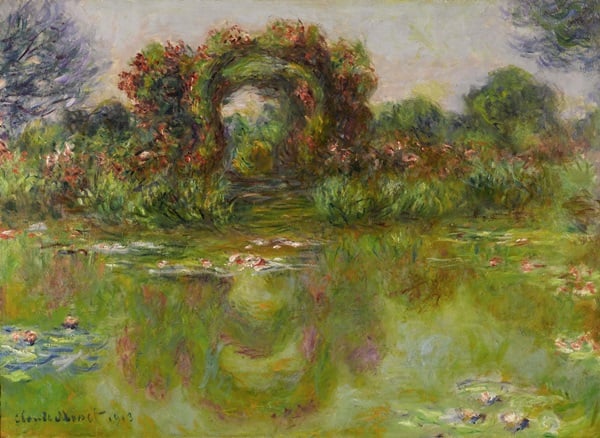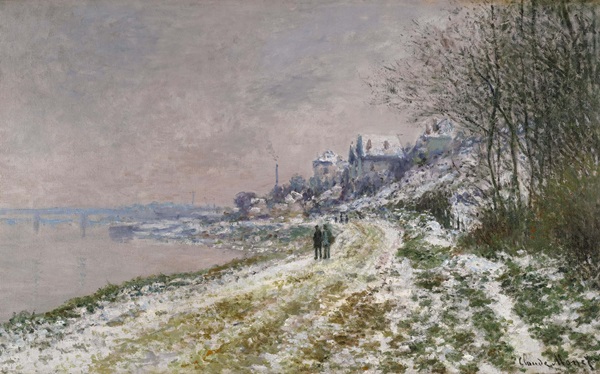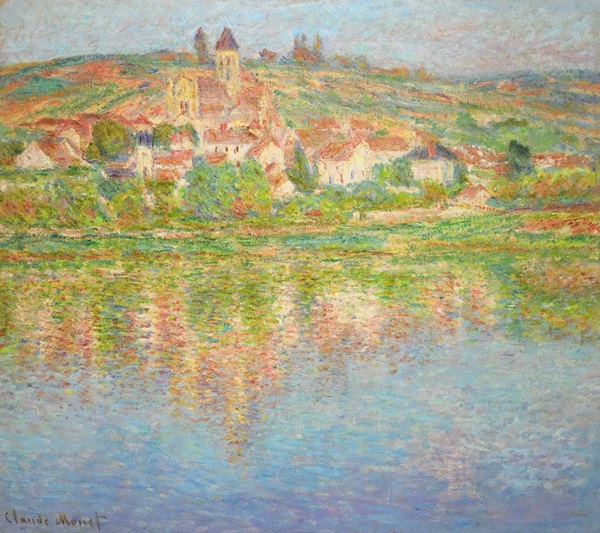Sotheby’s will offer an outstanding group of six
paintings by Claude Monet, spanning the 1870s through the 1910s and including
many of his most celebrated subjects: water lilies, Venice, a snowscape, the Seine
and the Normandy coast. The works are emerging after significant time spent in
their respective private collections, including a prime example of the artist’s
iconic Nymphéas (‘Water Lilies’) series that was acquired by its
present owner in 1955 (estimate $30–45 million*), and a Venice scene restituted
to the son of legendary collector Jakob Goldschmidt in 1960 that is on offer from
the collection of his grandson, the late Anthony Goldschmidt (estimate $15–20
million). In total, the six Monet paintings are estimated to achieve in excess
of $78 million. Each of the works will be on view in London from 10–14 April,
before returning to New York for exhibition on 1 May.
Simon Shaw, Co-Head of
Sotheby’s Worldwide Impressionist & Modern Art Department, commented: “The
six works by Monet that we are privileged to present this May represent exactly
what buyers are seeking at this moment: several of his most famous scenes,
emerging from prestigious private collections and completely fresh to the
market. We’re undeniably witnessing an exceptional moment for great works by
Monet at Sotheby’s. As new generations and new markets rediscover the master, the
supply of strong examples remaining in private hands is shrinking fast. The
result is fierce competition that leads to the results we have witnessed
recently at Sotheby’s.”
Sotheby’s sold 18 works by Monet in 2014, with buyers
from the US, UK, Europe, the Middle East and Asia demonstrating the global
appeal of his enduring genius in today’s market. The works together achieved a
remarkable $190.5 million, led by another example of the Nymphéas paintings
(dated to 1906) that sold for $54.1 million – the second-highest price for any
work by the artist at auction. Sotheby’s sold five works by Monet in its February 2015 Evening Sale of Impressionist & Modern Art in London, which together
totaled $83.8 million. That group was led by Le Grand Canal, another Venice
picture that fetched $35.8 million – the current auction record for a Venice
scene by the artist.
Nymphéas 1905 Estimate $30–45 million
Monet’s Nymphéas paintings
stand as the most celebrated series in Impressionist art. The famous lily pond
in the artist’s gardenat Giverny provided the subject matter for most of his
major late works, recording the evolution of his style and his constant pictorial
innovations. The present example dates from 1905, and has
remained in the same distinguished private collection since 1955.
Until
Sotheby’s worldwide exhibitions this spring, the painting has not been viewed in
public since 1945.
This work was included in the seminal exhibition held at the
Galerie Durand-Ruel in 1909, which Monet titled Les nymphéas, series de paysages
d'eau par Claude Monet. The artist insisted on payment for almost all the works
to be included in the show, resulting in legendary dealer Durand-Ruel – who did
not have the funds to bankroll the whole exhibition – having to acquire the
pictures jointly with the Bernheim-Jeune brothers. Monet and the dealers chose
48 canvases, all of the same subject, which were shown in three rooms and drew
the attention and admiration of countless collectors.
The first owners of the
present Nymphéas were Émil and Alma Staub-Terlinden of Männedorf. Together they
amassed one of the finest private collections of Impressionist art in
Switzerland, with much of it being purchased over a short period of time around
the end of the 1910s. The painting remained in the Staub-Terlinden’s possession
for many years, before being acquired by the present owner.
Le Palais Ducal 1908 Estimate $15–20 million
Monet’s
spectacular view of the Palazzo Ducale on the Grand Canal belongs to the extraordinary
series he completed in the fall of 1908 in Venice. Painted from the south-east
vantage of a floating pontoon, the scene depicts the Palace, with its Byzantine
fenestrations adorning the façade, alongside the Ponte della Paglia and the
prison building on the right. Le Palais Ducal was confiscated from noted
collector Jakob Goldschmidt by the National Socialist Government in February
1941. The painting was included in a forced auction of the Goldschmidt collection
in September of that year, where it was bought as a present for the Nazi
industrialist Dr. Albert Vögler – a former client of Jakob, who owed much of his
success to Jakob’s financial genius. In 1960, the picture was reclaimed from
Vögler’s heirs by Jakob’s son Erwin Goldschmidt, following 10
years of litigation in Hamburg. It subsequently descended to Erwin’s son
Anthony Goldschmidt, who died in 2014. Sotheby’s held the first evening sale in
its history in1958, with an auction dedicated to a selection of works that
Jakob Goldschmidt had been able to get out of Germany – both through friends,
and hidden in the trunk of his car. This landmark sale broke numerous records
and ushered in a new era for the Impressionist & Modern art market. As it was
restituted in 1960, the present work was not offered as part of this famed sale
– as a result, it has never been exhibited publicly until Sotheby’s exhibitions
this spring.
Bassin aux nymphéas, les rosiers 1913 Estimate $18–25 million
A
vibrant example from 1913, Bassin aux nymphéas, les rosiers represents Monet at
the height of his mature style. Here he depicts an arceaux de roses overlooking the
tranquil surface of a pond with scattered clusters of water lilies. Monet
painted three oils from this precise vantage point, one of which is now housed
at the Phoenix Art Museum in Phoenix, Arizona, and the current version is the
largest from this series. The work was acquired by its present owner in 1991.
Le
Chemin d'Epinay, effet de neige 1875 Estimate $6–8 million
Resplendent with the
glimmer and frosty sheen of snow and ice, Le Chemin d'Epinay, effet de neige depicts
the trodden road leading into the town of Épinay-sur-Seine on the outskirts of
Paris. This picture dates from the height of Monet's involvement with the
Impressionists in Paris, when the artist was considered the premier landscape
painter of the group – among whom snow scenes (effet de neige) were an
important tradition. The present work may have been included in the historic
second group showing of the Impressionists in 1876, as both it and a picture
currently in the collection of the Albright-Knox Gallery match the description
of one listed in the 1876 catalogue. It was acquired by its present owner at a
Sotheby’s New York auction in 1984.
La Seine à Vétheuil 1901 Estimate $6–8
million
The small village of Vétheuil is situated along the Seine between the
city of Mantes and the town of Vernon, and was home to Monet and his family
between 1878 and 1880. This picturesque location was the site of some of
Monet’s most successful Impressionist landscapes during this period, and continued
to fascinate him well into his later career. Of the 15 paintings from the
Vétheuil series, a number are now in the collections of major international
museums, including the Art Institute of Chicago, Art Gallery of Ontario,
Toronto, The Musée d’Orsay in Paris, and The Pushkin Museum in Moscow. The work
has remained in the same private collection since 1955, and has never before
appeared at auction.
Au Val Saint-Nicolas près Dieppe, matin 1897 Estimate $3–4
million
This dramatic cliff-top view of the Atlantic dates from Monet's
painting expedition in Pourville in 1897. These paintings of the Normandy coast
were the first works Monet completed after the exhibition of his Rouen Cathedral
series, and his concern with capturing the fleeting effects of light and
atmosphere and the way they transform a landscape predominates.





